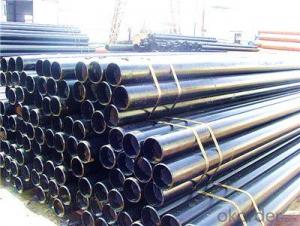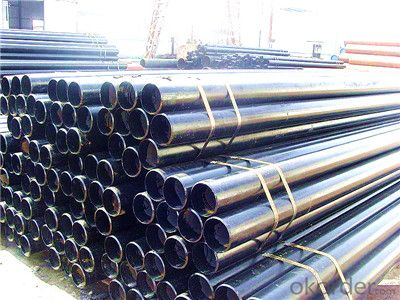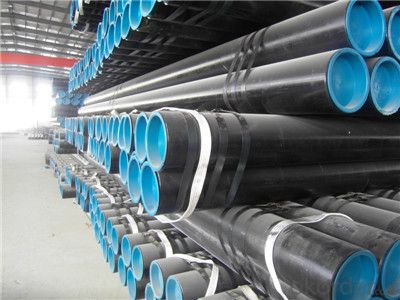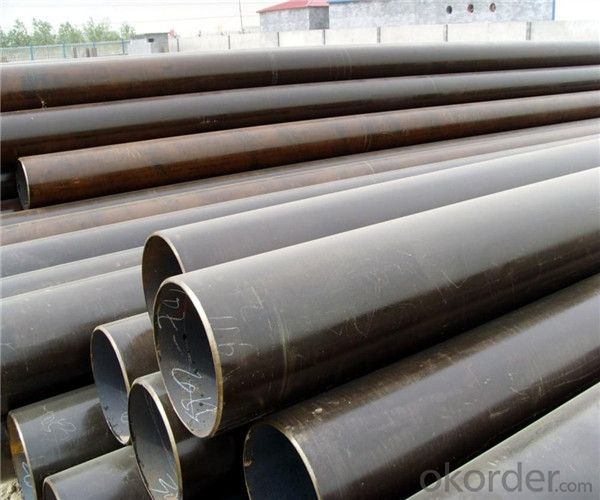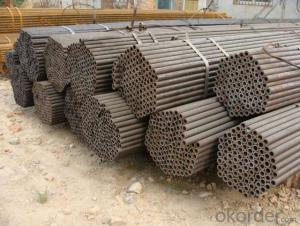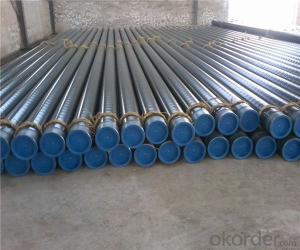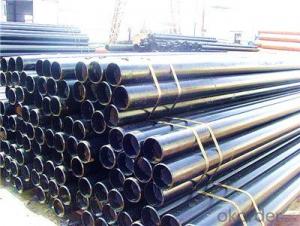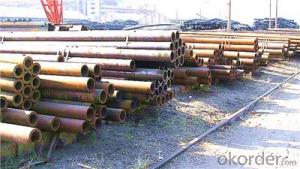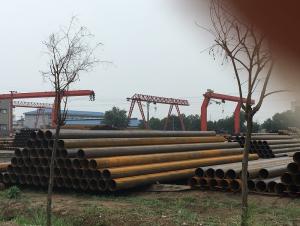Seamless Steel Pipe with High Quality/Best Price
- Loading Port:
- Tianjin
- Payment Terms:
- TT OR LC
- Min Order Qty:
- 50 m.t.
- Supply Capability:
- 3000000 m.t./month
OKorder Service Pledge
OKorder Financial Service
You Might Also Like
PRODUCT DETAILS
1.Structure of Seamless Steel Pipe Description:
A large amount of Seamless Steel Pipes is offered to the clients at cost effective rates. These pipes are extremely durable, resistant to corrosion and have high tensile strength. Our pipes are used in nuclear plants, power plants, refineries and construction industry across the country. Furthermore, we are capable of providing these seamless pipes to the clients in bulk quantity.
2.Main Features of the Steel Pipe:
• High manufacturing accuracy
• High strength
• Small inertia resistance
• Strong heat dissipation ability
• Good visual effect
•Reasonable price
3.Seamless Steel Pipe Specification:
| Standard: | GB, DIN, ASTM,ASME, ASTM A106-2006, ASTM A53-2007 |
| Grade: | 10#,20#, 45#, 16Mn |
Thickness: | 8 - 33 mm |
| Section Shape: | Round |
| Outer Diameter: | 133 - 219 mm |
| Place of Origin: | Shandong, China (Mainland) |
| Secondary Or Not: | Non-secondary |
| Application: | Hydraulic Pipe |
| Technique: | Cold Drawn |
| Certification: | API |
| Surface Treatment: | factory state or painted black |
| Special Pipe: | API Pipe |
| Alloy Or Not: | Non-alloy |
| Length: | 5-12M |
| Outer Diameter: | 21.3-610mm |
| Packaging Details: | Seaworthy packages, bundles wrapped with strong steel strip |
4.FAQ of Seamless steel pipe:
①How is the quality of your products?
Our products are manufactured strictly according to national and internaional standard, and we take a test
on every pipe before delivered out. If you want see our quality certifications and all kinds of testing report, please just ask us for it.
Guaranteed: If products’ quality don’t accord to discription as we give or the promise before you place order, we promise 100% refund.
②How about price?
Yes, we are factory and be able to give you lowest price below market one, and we have a policy that “ for saving time and absolutely honest business attitude, we quote as lowest as possible for any customer, and discount can be given according to quantity”,if you like bargain and factory price is not low enough as you think, just don’t waste your time.Please trust the quotation we would give you, it is professional one.
③Why should you chose us?
Chose happens because of quality, then price, We can give you both.Additionally, we can also offer professional products inquiry, products knowledge train(for agents), smooth goods delivery, exellent customer solution proposals.Our service formula: good quality+good price+good service=customer’s trust.
SGS test is available, customer inspection before shipping is welcome, third party inspection is no problem.
Any question, pls feel free to contact us !
- Q: Are steel pipes suitable for wastewater treatment facilities?
- Steel pipes are indeed a suitable option for wastewater treatment facilities. These facilities commonly employ steel pipes because of their impressive strength, durability, and resistance against corrosion. Given that wastewater treatment facilities often deal with corrosive and abrasive substances, steel pipes have the ability to endure these harsh conditions. Furthermore, steel pipes come in various sizes and configurations, allowing for effortless installation and customization to meet the specific requirements of the facility. Moreover, if necessary, steel pipes can be easily repaired or replaced, ensuring the long-lasting and dependable nature of the wastewater treatment system. Ultimately, steel pipes are an appropriate choice for wastewater treatment facilities due to their strength, durability, corrosion resistance, and flexibility for installation and maintenance.
- Q: How do you repair damaged steel pipes?
- To repair damaged steel pipes, there are several steps that can be followed: 1. Identify the extent of the damage: Assess the severity of the damage to determine if it can be repaired or if the pipe needs to be replaced altogether. 2. Isolate and drain the section: Shut off the water supply to the damaged section of the pipe and drain any remaining water to prevent further leakage or damage. 3. Clean the damaged area: Remove any dirt, rust, or other debris from the damaged area. This can be done using a wire brush or sandpaper. 4. Prepare the damaged area: Roughen the surface of the damaged area using coarse sandpaper. This will help the repair material adhere better to the pipe. 5. Choose a repair method: Depending on the size and location of the damage, there are various repair methods available. Some common options include using epoxy putty, pipe wraps, or clamps. 6. Apply the repair material: Follow the instructions provided with the chosen repair method to apply the material to the damaged area. Ensure that it covers the entire damaged section and extends slightly beyond it for added protection. 7. Allow the repair to cure: Give the repair material sufficient time to cure as per the manufacturer's instructions. This will ensure a strong bond and effective sealing of the damaged area. 8. Test the repair: Once the repair has cured, turn the water supply back on and check for any leaks. If there are no signs of leakage, the repair is successful. Otherwise, reevaluate the repair or consider seeking professional assistance. It is important to note that these steps provide a general guideline for repairing damaged steel pipes. However, the specific repair method may vary depending on the size and severity of the damage. In complex cases or if unsure, it is recommended to consult a professional plumber or pipe repair specialist.
- Q: How are steel pipes protected against mechanical impact?
- Steel pipes are protected against mechanical impact through various methods such as adding protective coatings, using steel pipe supports and clamps, or installing protective barriers to absorb and distribute impact forces.
- Q: How are steel pipes measured?
- Steel pipes are typically measured by their outer diameter (OD) and wall thickness. The OD is measured using a caliper or tape measure, while the wall thickness is determined using a specialized instrument called a micrometer. These measurements are crucial in determining the size and strength of steel pipes for various applications.
- Q: Are steel pipes more expensive than other types of pipes?
- Steel pipes can be more expensive than other types of pipes, but this can vary depending on various factors such as the size, grade, and specific application requirements.
- Q: How do steel pipes handle expansion and contraction?
- Steel pipes handle expansion and contraction through their inherent elasticity and ability to withstand high temperatures. When exposed to heat, steel pipes expand due to thermal expansion, and when cooled, they contract due to thermal contraction. This expansion and contraction are accommodated by the flexibility of the steel material, allowing it to withstand the changes in size without significant damage or deformation. Additionally, proper installation techniques such as the use of expansion joints and loops can also help accommodate the expansion and contraction of steel pipes, ensuring their integrity and longevity.
- Q: How are steel pipes insulated to prevent condensation?
- Steel pipes are typically insulated using materials such as foam or fiberglass that have low thermal conductivity. These insulating materials create a barrier that prevents the transfer of heat between the pipe and the surrounding environment, reducing the temperature difference and minimizing the chance of condensation occurring on the pipe surface.
- Q: How are steel pipes protected against microbial corrosion?
- Steel pipes are protected against microbial corrosion through various methods. One common method is the use of coatings on the pipe's surface. These coatings act as a barrier between the steel and the surrounding environment, preventing the entry of microbes and their corrosive byproducts. Coatings such as epoxy, polyethylene, and fusion bonded epoxy are often applied to the pipes to provide this protection. Another method is the use of corrosion inhibitors. These inhibitors are added to the fluid flowing through the pipe to inhibit microbial growth and prevent corrosion. These inhibitors can be organic or inorganic compounds that work by either killing the microbes or inhibiting their metabolic activity. Additionally, proper maintenance and cleaning of the pipes are crucial in preventing microbial corrosion. Regular inspections and cleaning can help remove any biofilms or microbial deposits that may have formed on the pipe's surface. This reduces the potential for microbial corrosion and extends the lifespan of the pipes. In some cases, cathodic protection may also be employed. This involves the use of sacrificial anodes or impressed current systems to provide a protective electrical current to the pipe. This current helps to prevent the formation of corrosive microorganisms and protects the steel from corrosion. Overall, a combination of coatings, corrosion inhibitors, regular maintenance, and cathodic protection techniques are used to protect steel pipes against microbial corrosion. These strategies help to ensure the longevity and integrity of the pipes in various industries, such as oil and gas, water supply, and sewage systems.
- Q: What are the different types of steel pipe connections for fire sprinkler systems?
- There are several types of steel pipe connections commonly used in fire sprinkler systems, including threaded connections, grooved connections, and welded connections. Threaded connections involve screwing the pipes together using tapered threads and are commonly used for smaller pipe sizes. Grooved connections use a coupling and gasket system to join the pipes, creating a secure and flexible connection. Welded connections involve permanently joining the pipes together using heat and are typically used for larger pipe sizes or in situations where maximum strength is required.
- Q: Are steel pipes suitable for food processing facilities?
- Yes, steel pipes are suitable for food processing facilities. Steel is a durable and hygienic material that is resistant to corrosion, making it ideal for transporting food products and maintaining their quality and safety. Additionally, steel pipes are easy to clean and disinfect, further ensuring sanitation standards in food processing facilities.
Send your message to us
Seamless Steel Pipe with High Quality/Best Price
- Loading Port:
- Tianjin
- Payment Terms:
- TT OR LC
- Min Order Qty:
- 50 m.t.
- Supply Capability:
- 3000000 m.t./month
OKorder Service Pledge
OKorder Financial Service
Similar products
Hot products
Hot Searches
Related keywords
